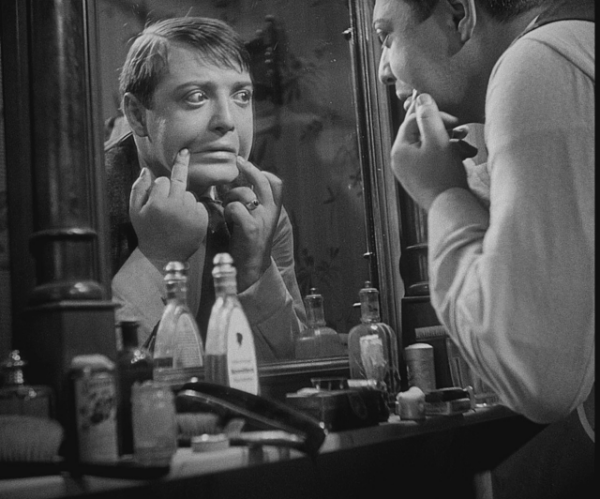M (Fritz Lang, 1931)
Film Forum
209 West Houston St.
Wednesday, July 22, 10:00
Series continues through August 5
212-727-8110
filmforum.org
 Fritz Lang’s first sound film, following such classic silent works as Metropolis and Die Nibelungen, is a masterpiece of precision, a crime thriller nonpareil in its examination of a serial killer, mob justice, and the psychological nature of good and evil. In M — Eine Stadt sucht einen Mörder, Peter Lorre stars as Hans Beckert, a creepy young man who befriends children before abducting and murdering them. Even with a reward out for his capture, he can’t stop himself from taking yet more little girls, in broad daylight, and writing letters to the police and a local newspaper, practically daring them to catch him. As his spree continues, the local community grows more and more frightened and suspicious, and men and women start looking suspiciously at anyone who even so much as nods to a child on the streets, mass hysteria beckoning. As the police try to figure out a plan of action, the criminals band together and hire beggars to try to track down Beckert, since the larger police presence is negatively impacting their business. Eventually, Beckert, who has a fondness for whistling Edvard Grieg’s “In the Hall of the Mountain King,” is spotted with a child, leading to a series of scenes that are simply spectacular in the flow of their movement as the riveting denouement approaches.
Fritz Lang’s first sound film, following such classic silent works as Metropolis and Die Nibelungen, is a masterpiece of precision, a crime thriller nonpareil in its examination of a serial killer, mob justice, and the psychological nature of good and evil. In M — Eine Stadt sucht einen Mörder, Peter Lorre stars as Hans Beckert, a creepy young man who befriends children before abducting and murdering them. Even with a reward out for his capture, he can’t stop himself from taking yet more little girls, in broad daylight, and writing letters to the police and a local newspaper, practically daring them to catch him. As his spree continues, the local community grows more and more frightened and suspicious, and men and women start looking suspiciously at anyone who even so much as nods to a child on the streets, mass hysteria beckoning. As the police try to figure out a plan of action, the criminals band together and hire beggars to try to track down Beckert, since the larger police presence is negatively impacting their business. Eventually, Beckert, who has a fondness for whistling Edvard Grieg’s “In the Hall of the Mountain King,” is spotted with a child, leading to a series of scenes that are simply spectacular in the flow of their movement as the riveting denouement approaches.
In making M, Lang was inspired by real events involving multiple serial killers. Although the film in no way preaches, Lang, who cowrote the script with his then-wife, Thea von Harbou, considered M very much a message picture. On May 20, 1931, he wrote in the German newspaper Die Filmwoche, “If this film based on factual reports helps to point an admonishing and warning finger at the unknown, lurking threat, the chronic danger emanating from the constant presence among us of compulsively and criminally inclined individuals, forming, so to speak, a latent potential that may devour our lives in flames—and especially the lives of the most helpless among us—and if the film also helps, perhaps, even to avert this danger, then it will have served its highest purpose and drawn the logical conclusion from the quintessential facts assembled in it.” M feels eerily prescient and especially relevant today, when parents’ fear for the safety of their children has perhaps never been greater. Seeing adults waiting outside schools, praying for their kids to be out of harm’s way, is something that can now be witnessed across America day after day.
Lorre (The Man Who Knew Too Much, The Maltese Falcon) is exceptional as Beckert, a baby-faced man who might not be quite as evil as everyone imagines. Lang and cinematographer Fritz Arno Wagner (Nosferatu, Diary of a Lost Girl) regularly show Beckert in shadow and in mirrors, as if there are two sides to this child killer. Lang uses no musical score, instead allowing natural sound, and very often pure silence, as Lang (Fury, Ministry of Fear) recognizes that he doesn’t need to overplay his hand. As depicted in the film, if there’s one thing that everyone can agree on, from cops and criminals to blind balloon sellers and mothers and fathers, it’s that there is nothing worse than a man who murders children. Yet Lang ultimately is able to extract some sympathy for Beckert, who makes a powerful plea near the end of the film. Watching M is a gripping, unforgettable experience, despite its terrifying subject matter.
M is screening July 22 at 10:00 as part of Film Forum’s “True Crime” series, which continues through August 5 with such other ripped-from-the-headlines favorites as Sidney Lumet’s Serpico and Dog Day Afternoon, Tadashi Imai’s Darkness at Noon, John McNaughton’s Henry: Portrait of a Serial Killer, and double features of Richard Fleischer’s The Girl in the Red Velvet Swing and Compulsion and William Friedkin’s The French Connection and The Brink’s Job.

